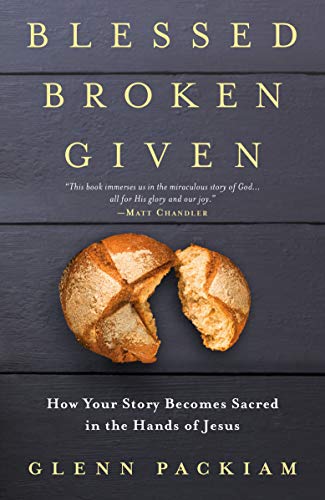
This Week on Seminary Dropout…
Glenn Packiam is an Associate Senior Pastor at New Life Church, a multi-congregational church in Colorado Springs. He also serves as the Lead Pastor of New Life Downtown, a thriving New Life congregation in the heart of the city. An ordained Anglican priest serving in a non-denominational church, Packiam treasures Christian practices that are both ancient and modern. He has a doctorate from Durham University, UK. Glenn, his wife Holly, and their four children live in Colorado Springs.

An invitation to find beauty and meaning in the ordinary and imperfect aspects of your life; not as a call to settle for less, but rather as a way to mysteriously participate in God’s power and purpose.
Glenn Packiam wants to empower readers to find great joy, purpose, and passion in their daily living. While bread may be one of the most common items on our dinner tables, Jesus chose to take it at the Last Supper and invest deep, wonderful, and transcendent meaning in it. Like the bread that was blessed, broken, and given; readers will see how God uses ordinary experiences to cultivate their mission and their brokenness to bring healing to the world. The ordinary is not the enemy; it is the means by which God accomplishes the miraculous. Through clear biblical teaching and practical steps, Packiam leads the reader into a more purposeful, directed, hopeful future. -From the Publisher


Missio Alliance Comment Policy
The Missio Alliance Writing Collectives exist as a ministry of writing to resource theological practitioners for mission. From our Leading Voices to our regular Writing Team and those invited to publish with us as Community Voices, we are creating a space for thoughtful engagement of critical issues and questions facing the North American Church in God’s mission. This sort of thoughtful engagement is something that we seek to engender not only in our publishing, but in conversations that unfold as a result in the comment section of our articles.
Unfortunately, because of the relational distance introduced by online communication, “thoughtful engagement” and “comment sections” seldom go hand in hand. At the same time, censorship of comments by those who disagree with points made by authors, whose anger or limited perspective taints their words, or who simply feel the need to express their own opinion on a topic without any meaningful engagement with the article or comment in question can mask an important window into the true state of Christian discourse. As such, Missio Alliance sets forth the following suggestions for those who wish to engage in conversation around our writing:
1. Seek to understand the author’s intent.
If you disagree with something the an author said, consider framing your response as, “I hear you as saying _________. Am I understanding you correctly? If so, here’s why I disagree. _____________.
2. Seek to make your own voice heard.
We deeply desire and value the voice and perspective of our readers. However you may react to an article we publish or a fellow commenter, we encourage you to set forth that reaction is the most constructive way possible. Use your voice and perspective to move conversation forward rather than shut it down.
3. Share your story.
One of our favorite tenants is that “an enemy is someone whose story we haven’t heard.” Very often disagreements and rants are the result of people talking past rather than to one another. Everyone’s perspective is intimately bound up with their own stories – their contexts and experiences. We encourage you to couch your comments in whatever aspect of your own story might help others understand where you are coming from.
In view of those suggestions for shaping conversation on our site and in an effort to curate a hospitable space of open conversation, Missio Alliance may delete comments and/or ban users who show no regard for constructive engagement, especially those whose comments are easily construed as trolling, threatening, or abusive.